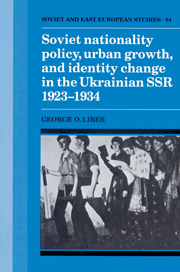Book contents
- Frontmatter
- Contents
- List of tables
- Acknowledgments
- Abbreviations
- A note on transliteration
- Maps
- Introduction
- Part I Periphery and center
- Part II Social changes
- Part III Political consequences
- 6 The transformation of the urban Ukrainian identity
- 7 The ideological challenge of Ukrainian national communism
- Part IV Center's reaction
- Conclusion
- Appendices
- Notes
- Bibliography
- Index
- Soviet and East European Studies
6 - The transformation of the urban Ukrainian identity
Published online by Cambridge University Press: 03 February 2010
- Frontmatter
- Contents
- List of tables
- Acknowledgments
- Abbreviations
- A note on transliteration
- Maps
- Introduction
- Part I Periphery and center
- Part II Social changes
- Part III Political consequences
- 6 The transformation of the urban Ukrainian identity
- 7 The ideological challenge of Ukrainian national communism
- Part IV Center's reaction
- Conclusion
- Appendices
- Notes
- Bibliography
- Index
- Soviet and East European Studies
Summary
Language is a means of communication and the success of this medium depends not only on the message in and of itself, but also on the level of intimacy, a personal point of reference, of the tool. Employing native languages in the non-Russian regions would be the Soviet Union's most effective means of communicating to its large, multilingual population. In addition to pragmatic considerations, native-language use had a political purpose: to neutralize the hostility of, if not win over, the non-Russian peasants and elites by condemning the Russification of the tsarist past. This policy was also a clear demonstration of respect for the languages and cultures of the recently oppressed and nationally politicized non-Russians.
Following this reasoning, the Soviet government and Communist Party expanded the base of their modernization effort by investing heavily in massive literacy campaigns, teaching the non-Russians to read and write in their own languages. In the Caucasus, Central Asia, and the Far East, the Soviet government Latinized the scripts of the North Caucasian (Circassian, etc.), Turkic, Iranic (Ossetian and Tadzhik), and other languages. After subsidizing the standardization and modernization of the non-Russian languages, the government also expanded primary, secondary, and higher education in the indigenous languages. The number and circulation of native-language newspapers, journals, and books expanded greatly, and in some republics more appeared in the non-Russian languages than the number of periodicals published in Russian or imported from the Russian republic. By stressing language and literacy, the Soviet government in effect created and expanded the number of nativelanguage consumers within each non-Russian region.
- Type
- Chapter
- Information
- Soviet Nationality Policy, Urban Growth, and Identity Change in the Ukrainian SSR 1923–1934 , pp. 107 - 120Publisher: Cambridge University PressPrint publication year: 1992



